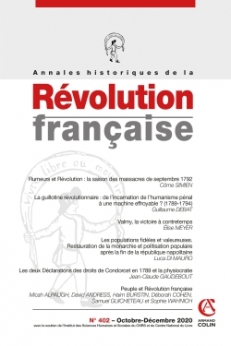
Annales historiques de la Révolution française Nº402 (4/2020)
Pour acheter ce numéro, contactez-nous
Recevez les numéros de l'année en cours et accédez à l'intégralité des articles en ligne.
La reconquête du Royaume de Naples par l’armée paysanne du cardinal Ruffo en 1799 devient, pour Ferdinand IV de Bourbon, non seulement l’occasion de se rétablir sur le trône et de purger toute trace de républicanisme, mais aussi de moderniser l’État dans le sens d’une centralisation monarchique, menant finalement à bien les réformes limitant le pouvoir de la noblesse initiées lors de la décennie précédente et jusque-là restées inachevées. L’action punitive de la noblesse et de la bourgeoisie par les structures provisoires de gouvernement ainsi que la conscience du rôle joué, dans cette entreprise, par la Santa Fede (l’armée paysanne de la Sainte Foi, organisée et guidée par le cardinal Ruffo) amènent, cependant, le peuple du royaume à vouloir intervenir dans la sphère publique bien au-delà de ce que la monarchie n’aurait pu prévoir ou souhaiter. En effet, la déception populaire quant à l’issue de cette Première Restauration éloigne, de facto, le programme politique de la Couronne des instances politiques du bas peuple, contribuant ainsi, dans le sillage de la révolte de 1647, à faire de ce dernier un acteur autonome sur la scène napolitaine.
The reconquest of the Kingdom of Naples by the peasant army of Cardinal Ruffo in 1799 became an opportunity for Ferdinand IV of Bourbon to reestablish himself on the throne and to purge all traces of republicanism. It was also an occasion to modernize the State in favor of monarchical centralization in a way that finally realized the reforms of limiting the power of the nobility, a power initiated in the previous decade that had remained largely unfinished. The punitive action of the nobility and the bourgeoisie through the provisional structures of government and the awareness of the role played in this undertaking by the Santa Fede (the peasant army of the Holy Faith, organized and guided by Cardinal Ruffo) inspired the people in the kingdom to intervene in the public sphere well beyond what the monarchy could have foreseen or desired. In fact, popular disappointment with the outcome of the First Restoration distanced de facto the political program of the Crown from the political authorities of the lower classes, thus contributing, in the wake of the 1647 revolt, to the latter becoming an autonomous actor on the Neapolitan scene.